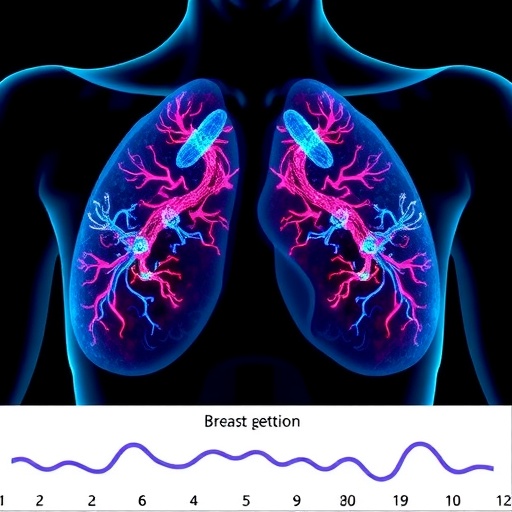In a groundbreaking advancement poised to reshape the landscape of breast cancer treatment, researchers have harnessed the power of next-generation sequencing (NGS) to propel precision oncology forward. This pioneering study, recently published in Medical Oncology, delivers an in-depth mutation profiling of breast cancer tumors, providing vital genomic insights that promise to revolutionize therapeutic strategies. The work helmed by Bhavnagari and colleagues intricately maps the mutational terrain of breast cancer, enabling clinicians to tailor interventions far more precisely than ever before.
Breast cancer, as one of the most complex and heterogenous malignancies, exhibits a vast diversity in molecular alterations that traditional diagnostic modalities have struggled to parse effectively. The advent of NGS technologies offers an unprecedented resolution, revealing subtle genetic aberrations that drive tumorigenesis and resistance mechanisms. In this study, the researchers utilized a comprehensive NGS panel targeting somatic mutations across multiple breast cancer subtypes, illuminating the genetic signatures underpinning disease progression and therapeutic response.
The methodology emphasized deep sequencing coverage to capture low-frequency variants, which often evade detection yet bear significant clinical implications. By integrating bioinformatics pipelines with rigorous variant annotation, the team achieved a robust catalog of pathogenic mutations, copy number variations, and novel genomic alterations. This granular mutation profiling empowers oncologists with actionable data, fostering precision medicine approaches that transcend the one-size-fits-all paradigm.
One of the most compelling revelations from the study was the identification of recurrent mutations in key oncogenes and tumor suppressor genes that correlate with specific breast cancer phenotypes. Variants in genes such as PIK3CA, TP53, and ESR1 emerged as critical determinants of prognosis and therapeutic vulnerabilities. This insight opens pathways for deploying targeted therapies—such as PI3K inhibitors or novel agents modulating estrogen receptor pathways—with increased efficacy and reduced off-target toxicity.
Moreover, the study sheds light on the intratumoral heterogeneity shaped by subclonal mutations, a factor implicated in treatment resistance and disease relapse. By delineating these subpopulations genetically, the researchers highlight the potential for monitoring tumor evolution in real-time through liquid biopsy platforms, ultimately enabling adaptive therapy modifications that preempt resistance.
A novel aspect addressed was the integration of mutation burden analysis as a surrogate for tumor mutational load, which holds promise for predicting responses to immunotherapies. While immunotherapeutic approaches have seen limited success in breast cancer thus far, stratifying patients based on genomic mutational landscapes could identify those more likely to benefit, marking a leap forward in patient selection criteria.
The implications extend to clinical trial design as well, where this mutation profiling framework can facilitate biomarker-driven enrollment strategies, enriching studies with genetically homogenous cohorts. Such refinement enhances the statistical power and relevance of trial outcomes, accelerating the path from bench to bedside for emerging therapeutics.
Notably, the study’s holistic approach aligns with the growing emphasis on precision oncology consortia worldwide, advocating for standardized NGS protocols and data-sharing platforms. This collaborative ethos promises to amplify the utility of genomic insights, enabling cross-institutional validations and expanding therapeutic armamentaria.
From a technological standpoint, advancements in NGS accuracy, throughput, and cost-efficiency underpin the feasibility of integrating such genomic analyses into routine clinical workflows. The researchers discuss the pivotal role of bioinformatic innovations in handling vast sequencing data, applying machine learning algorithms to predict functional impacts of variants, and ultimately guiding clinical decision-making with unparalleled precision.
Despite these advances, challenges remain in interpreting variants of unknown significance and integrating multi-omic data layers to capture epigenetic and transcriptomic nuances. The study calls for concerted efforts to refine annotation databases, functional assays, and longitudinal studies linking genomic profiles with patient outcomes.
Beyond the immediate clinical application, the study offers a rich resource for unraveling breast cancer biology, potentially uncovering novel therapeutic targets and resistance pathways. Such discoveries could spur the development of next-generation targeted agents, combination regimens, and personalized vaccination strategies.
Furthermore, the ethical and logistical considerations surrounding genomic data handling, patient consent, and equitable access to NGS-guided therapies are integral to the translational journey. The authors underscore the importance of integrating genomic medicine with patient-centric care models that address disparities and foster informed decision-making.
In essence, this mutation profiling study delineates a roadmap for the transformative convergence of genomics and oncology. The precision with which clinicians can now approach breast cancer management heralds a new era where treatments are finely tuned to the genetic idiosyncrasies of each tumor, maximizing therapeutic benefit while minimizing adverse effects.
As we stand on the cusp of routine clinical adoption of NGS-guided therapy, this research exemplifies how deep genomic characterization can inform personalized intervention strategies and ultimately improve survival outcomes. The implications resonate widely, offering hope for more effective, tailored breast cancer therapies that are responsive to tumor complexity and evolutionary dynamics.
The ongoing exploration of genomic data integration promises to refine diagnostic accuracy, guide innovative drug development, and personalize patient monitoring. This evolution reflects the broader shift within oncology towards data-driven, molecularly-informed medicine that strives to conquer cancer at its genetic roots.
The future of breast cancer treatment is undoubtedly genomics-driven, and studies like this are vital milestones that illuminate the path ahead. By translating mutational insights into targeted therapies, this research fosters a precision medicine paradigm that could turn the tide against one of the most formidable cancers affecting women worldwide.
Subject of Research: Breast cancer mutation profiling using next-generation sequencing for precision therapy.
Article Title: Translating genomic insights into therapy: an NGS-based mutation profiling study in breast cancer.
Article References:
Bhavnagari, H.M., Raval, A.P., Tarapara, B.V. et al. Translating genomic insights into therapy: an NGS-based mutation profiling study in breast cancer. Med Oncol 43, 9 (2026). https://doi.org/10.1007/s12032-025-03122-4
Image Credits: AI Generated
DOI: https://doi.org/10.1007/s12032-025-03122-4
Tags: advancements in cancer diagnosticsbioinformatics in mutation analysisbreast cancer mutation profilingdeep sequencing in cancer researchgenetic alterations in malignanciesgenomic insights in cancer therapyheterogeneity of breast cancernext-generation sequencing in oncologypersonalized treatment strategiesprecision medicine for breast cancersomatic mutations in breast tumorstargeted therapies for breast cancer





